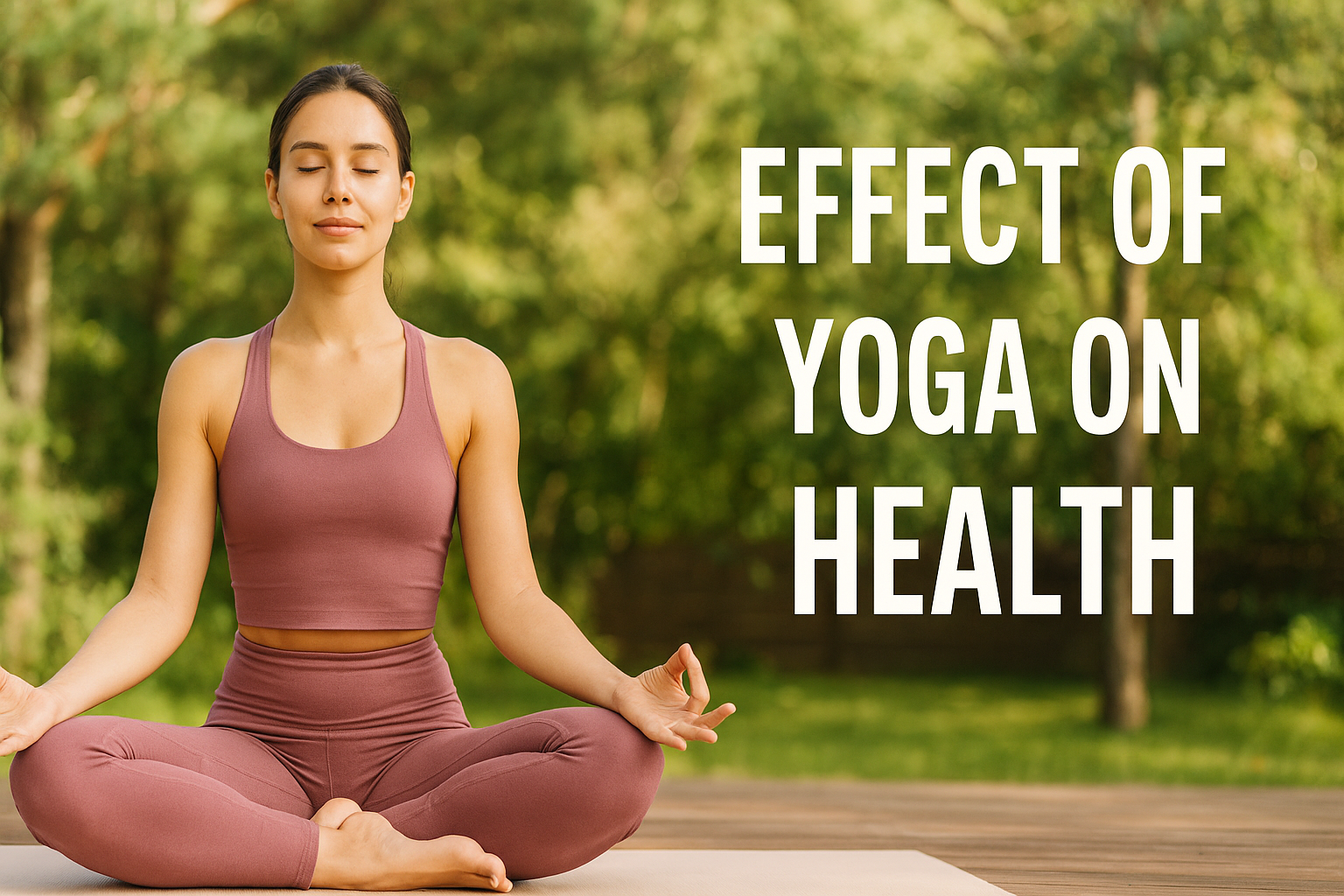Effect of Yoga on Health: A Complete Guide to Mind–Body Healing
Yoga is one of the world’s most powerful mind–body healing practices, blending physical movement, breath control, meditation, mindfulness, and lifestyle balance. The effect of yoga on health is so profound that millions of people now use yoga to improve flexibility, strengthen the body, reduce stress, balance hormones, support mental health, and enhance overall well-being.
In this comprehensive guide, we explore the benefits of yoga, the effect of yoga on physical and mental health, and how yoga influences digestion, immunity, sleep, hormones, and emotional balance.
If you are searching for a natural, holistic approach to health and wellness, yoga is one of the best practices to begin with.
What Is Yoga?
Yoga originated in ancient India as a complete system for cultivating harmony between the mind, body, breath, emotions, and spirit. Far beyond just stretching or exercise, yoga is a lifestyle that involves asana (postures), pranayama (breathing techniques), meditation, relaxation, diet, and inner awareness.
Modern science has now confirmed what yogis have practiced for centuries — the effect of yoga on health is powerful, long-lasting, and deeply transformative.
Effect of Yoga on Physical Health
The physical health benefits of yoga are some of the most widely experienced. Yoga affects multiple systems in the body — the muscular system, joints, cardiovascular system, digestive system, endocrine system, and immune system.
Improved Flexibility and Mobility
One of the most noticeable effects of yoga is increased flexibility. Gentle stretches with controlled breathing help muscles loosen naturally. This:
-
Reduces stiffness
-
Improves mobility
-
Prevents injuries
-
Enhances posture
Poses like Downward Dog, Cobra Pose, Triangle Pose, and Cat–Cow are especially effective.
Increased Strength and Muscle Tone
Yoga strengthens the body using natural body weight. Unlike heavy workouts, yoga builds lean, balanced muscle. Poses such as Plank, Warrior I & II, Chair Pose, Boat Pose, and Bridge Pose help develop strength without strain.
This results in:
-
Improved stamina
-
Better balance
-
Stronger core
-
Healthy joints
Improved Heart Health
Yoga lowers blood pressure, reduces cholesterol, and improves circulation. Slow breathing calms the cardiovascular system and reduces strain on the heart.
Breathing practices like Anulom Vilom, Bhastrika, and Bhramari Pranayama are highly beneficial for heart wellness.
👉 Also Read: Yoga for Stress and Anxiety Relief
Better Digestion and Gut Health

Yoga supports the digestive system by stimulating organs, improving metabolism, and reducing bloating. Twisting poses and gentle stretches help detoxify the body and strengthen the gut.
Helpful poses include:
-
Seated Twist
-
Wind-Relieving Pose
-
Cobra Pose
-
Child’s Pose
Boosts Immunity
Yoga reduces inflammation, balances stress hormones, and improves lymph circulation — all of which strengthen the immune system. A consistent yoga routine improves natural disease resistance and supports long-term health.
👉 Also Read: 10 Mind-Body Healing Practices
Effect of Yoga on Mental Health
Yoga is a powerful tool for mental well-being. Combining breathing, mindfulness, and gentle movement enhances brain function and emotional resilience.
Reduces Stress and Anxiety

One of the greatest effects of yoga on health is its ability to reduce stress. Yoga activates the parasympathetic nervous system — the “rest and relax” mode.
Benefits include:
-
Lower cortisol levels
-
Calm mind and body
-
Reduced anxiety
-
Better emotional balance
Meditation, pranayama, and Yoga Nidra are highly effective for stress relief.
Enhances Focus, Memory & Brain Function
Yoga improves concentration, mental clarity, and creativity. Deep breathing increases oxygen supply to the brain, which helps with cognitive performance.
-
Better decision-making
-
Sharper memory
-
Improved productivity
-
Balanced emotions
Techniques like Trataka (candle meditation) help improve focus.
Improves Sleep Quality

Yoga reduces tension and prepares the body for rest. Bedtime practices like:
-
Yoga Nidra
-
Forward bends
-
Slow breathing
-
Gentle stretching
help improve sleep quality and reduce insomnia.
Effect of Yoga on Hormones & Internal Health
Yoga influences the endocrine system, which controls mood, metabolism, menstrual cycles, and energy levels.
Balances Hormones Naturally
Yoga supports hormonal balance by stabilizing cortisol, insulin, thyroid hormones, and reproductive hormones. This helps manage:
-
PCOS
-
Thyroid imbalance
-
Mood swings
-
Fatigue
Poses like Cobra, Bow, Butterfly, and Bridge Pose support healthy endocrine function.
Supports Women’s Health
Yoga helps reduce menstrual cramps, improves fertility support, and eases menopausal symptoms.
Prenatal yoga also helps strengthen the pelvic muscles and reduce stress during pregnancy.
👉 Also Read: Herbal Tea Recipes
Spiritual and Emotional Effects of Yoga
Yoga is not only a physical activity — it is a path to inner peace and emotional stability.
Benefits include:
-
A calmer mind
-
Greater self-awareness
-
Increased positivity
-
Improved patience
-
Emotional resilience
Meditation and mindfulness help connect individuals with their inner self, promoting a deeper sense of purpose and harmony.
How Yoga Improves Overall Lifestyle
The effect of yoga on health extends beyond the mat. Practitioners experience:
-
Better discipline
-
Healthier habits
-
Mindful eating
-
Positive thinking
-
Lower stress reactivity
-
More consistent routines
Yoga becomes a lifestyle, not just an exercise routine.
How to Start a Yoga Practice
Even beginners can start yoga easily.
✔ Start with 10–20 minutes a day
✔ Learn basic poses
✔ Focus on breath, not perfection
✔ Practice on an empty stomach
✔ Stay consistent
Beginners can choose Hatha Yoga or simple routines.
👉 Also Read: Turmeric Benefits
Final Thoughts
The effect of yoga on health is profound, holistic, and life-changing. From stronger muscles and better digestion to reduced anxiety and improved emotional balance, yoga offers benefits that no other practice can match. Whether you’re a beginner or experienced practitioner, yoga has something to offer everyone.
FAQs
- What is the effect of yoga on overall health?
Yoga improves flexibility, strength, immunity, digestion, sleep, and mental well-being, making it a complete mind–body healing practice.
- How often should I do yoga for best results?
Practicing yoga 4–5 times per week for 20–30 minutes brings visible health benefits.
- Can yoga reduce stress and anxiety?
Yes. Deep breathing, meditation, and mindful movement reduce stress hormones and calm the nervous system.
- Can beginners start yoga easily?
Absolutely. Yoga is suitable for all ages and fitness levels. Start slowly, learn basic poses, and build gradually.
⚕️ Medical Disclaimer
The information provided in this article is for educational and informational purposes only and is not intended as a substitute for professional medical advice, diagnosis, or treatment. Always seek the guidance of a qualified healthcare provider with any questions you may have regarding a medical condition, dietary change, or wellness practice. Never disregard or delay seeking professional medical advice because of information found on this website.
Natural remedies and lifestyle suggestions may not be suitable for everyone. Results may vary depending on individual health conditions.
Explore more on Yogs Here






It’s interesting how yoga combines physical and mental wellbeing – the mention of breath control and mindfulness really highlights that. I also found a helpful overview of mind-body practices at https://seed3d.ai.